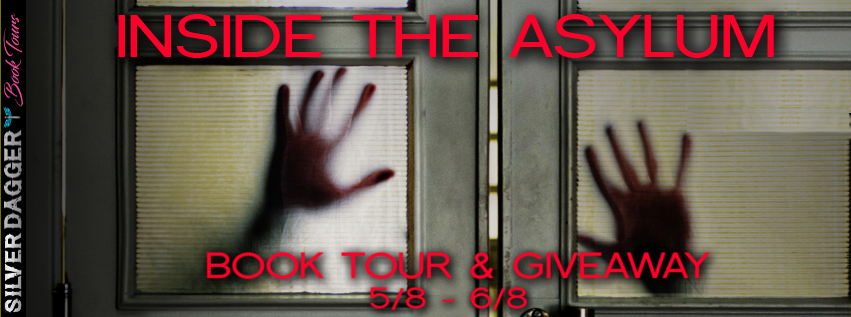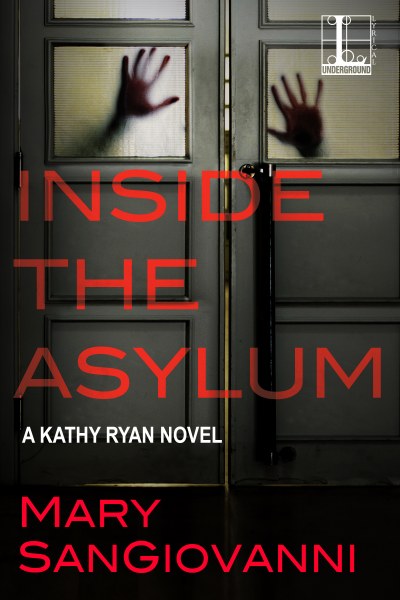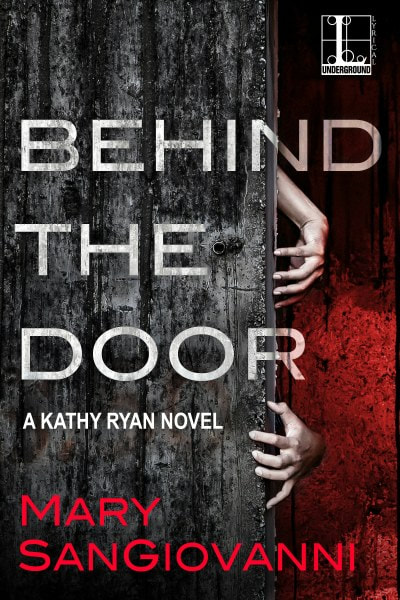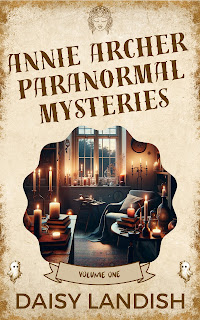Thursday, May 9, 2019
Book Tour + #Giveaway: Inside the Asylum by Mary SanGiovanni @marysangiovanni @SDSXXTours
Inside
the Asylum
A
Kathy Ryan Novel #2
by
Mary SanGiovanni
Genre:
Supernatural Horror
Pub
Date: 5/7/19
From
“master of cosmic horror” (Library Journal) Mary
SanGiovanni, comes the latest terrifying novel featuring occult
specialist Kathy Ryan . . .
A
mind is a terrible thing to destroy . . .
Kathy
has been hired to assess the threat of patient Henry Banks, an inmate
at the Connecticut-Newlyn Hospital for the Criminally Insane, the
same hospital where her brother is housed. Her employers believe that
Henry has the ability to open doors to other dimensions with his
mind—making him one of the most dangerous men in modern history.
Because unbeknownst to Kathy, her clients are affiliated with certain
government organizations that investigate people like Henry—and the
potential to weaponize such abilities.
What
Kathy comes to understand in interviewing Henry, and in her
unavoidable run-ins with her brother, is that Henry can indeed use
his mind to create “Tulpas”—worlds, people, and creatures so
vivid they come to actual life. But now they want life outside of
Henry. And they'll stop at nothing to complete their emancipation.
It's up to Kathy—with her brother's help—to stop them, and if
possible, to save Henry before the Tulpas take him over—and
everything else around him.
Amazon
* Apple
* B&N
* Google
* Kobo
* Kensington
Chapter
1
March
twenty-seventh marked three years since Henry Banks had woken up from the coma.
He kept track in a day planner, with new calendar refills for subsequent years,
by drawing a symbol he had been taught by his friends in the upper right hand
corner of each day’s page. Other than therapy sessions, he had no real
appointments anymore, but Henry jotted down notes about the day’s events,
things he learned or discovered, and each night before bed, he drew that symbol
of his far-reaching goals. Journaling, even Henry’s odd version of it, was
encouraged and allowed to continue as a means of reconnecting with one’s self
and feelings. His was more of an odd, disjointed grimoire of his mind, but that
seemed to be okay, too. He never forgot, not even during the trial when his
mind was…elsewhere. On days he couldn’t get to the planner, Maisie made sure
that at least the days were marked. It was important to him. He never forgot,
so neither did she.
Every
day that passed reminded him that he was drifting farther and farther from the
rest of humanity, so Henry didn’t think the three-year anniversary was cause
for celebration. Dr. Pam Ulster did, though, or at least convincingly pretended
to. Every year prior, she had suggested Henry do something nice for himself to
commemorate his “return to the world.” The irony was not lost on him. He didn’t
see how he was supposed to do much of anything since the orderlies, who were
not big on celebrations, watched him like hawks. Even if he wanted to, what
could he really give himself in his current situation? A walk in the sunshine
around the hospital grounds? An extra muffin with breakfast? Anything
else—anything worthwhile—would be noticed and probably taken away.
Besides,
it wasn’t like he’d come back from the dead. He’d just come back from…somewhere
else.
Henry
figured other people would have had reason to celebrate March twenty-seventh if
he’d died instead of coming out of that coma. Maybe that should have happened,
but it didn’t. Maisie, Orrin, Edgar, and the Others made sure of that. They’d
come out of Ayteilu and saved him. Or maybe they were right, and he had saved
them.
The
police and the lawyers and the doctors told him he’d done something bad to the
teenagers in his basement right before the coma. He couldn’t remember much
about that. He was pretty sure he hadn’t been the one who’d done it, but it was
his fault all the same. He’d seen those teenagers before; they hung around
outside the Dollar Tree and said mean things to him from behind the safety of
their cigarette smoke clouds when he went to shop there. The girl was pretty,
but she was sharp where she should have been soft, like something made of glass
or porcelain, something whose temper could shatter her into a thousand jagged,
deadly pieces. The three guys were mostly messy mops of hair, black trench
coats, and jeans. Their faces didn’t matter to him. Their fists did, and their
words; they often threatened the former with the latter. Henry wasn’t even sure
if they’d had eyes, but he imagined that if they did, those eyes were cold.
They
made fun of the holes in his t-shirts and the way he walked and the scar on his
shaved head. They made fun of the burn marks on the back of his shoulder and
neck and the way he growled at them instead of using words. Still, they had
always been an away-problem, an outside-the-house problem, like savage dogs on
leashes. They were tethered to the Dollar Tree, and if he could make it past
them to his car and then to his home, he would be safe.
Then
it turned out that they weren’t on leashes. They could move anywhere they
wanted. And they had chosen to break into his house, his safe
space. They’d brought baseball bats and knives. The Viper and the Others had
come simply to protect him.
Sometimes,
Henry thought he should have started keeping count in his planner on that night.
Dr.
Ulster had asked him once during a session why he bothered to maintain such
meticulous records of the past three years if he honestly believed everything
in his life had fallen apart since the coma. Why approach the planner as a
constant reminder of his deterioration, then? Why not just put the past behind
him and focus on getting better?
Henry
had told her then the truth about the Others, just like he had told the police
when they found what was left of the four teenagers in his basement. He told
them about Ayteilu and its tendency to swallow up reality. He’d told them about
Maisie and Orrin and Edgar and all the Others. He’d even told them about the
Viper. Maisie said that was okay. The problem was, he couldn’t show the
police or Dr. Ulster, so they hadn’t believed. He couldn’t make it all happen
on command, not back then. But he was learning, and over the last 1,095 days,
he was steadily growing better at it. What he didn’t tell anyone was that in
three days’ time, as set forth by Edgar’s prediction, he’d have complete
control in summoning the Others at will and opening the way to Ayteilu. The
Others hadn’t wanted him to share that part with anyone else.
Henry
peered through the gloom of his bedroom. His cot was against the wall across
from the door, which of course was locked now that it was lights out. On the
far side of the room was the door to his simple bathroom—one sink, one toilet,
both gleaming white—and next to that door was a small closet in which hung his
hospital-issued clothes, soft and harmless. No zipper teeth or sharp metal
claws there, not even buttons or laces. Beneath the clothes, like obedient
lapdogs curled up on the closet floor for the night, were a pair of loafers and
a pair of slippers. Against the back wall near where the head of his cot lay
was a small, barred window. The orderlies could open it sometimes to air the
room out but they had keys to do that and were allowed to reach through the
bars. That night, his window was closed but Henry didn’t mind. He just liked
having one, and from his, he could see the parking lot. Some people liked
seeing the neat, tight little lawns that constituted the hospital grounds, but
he preferred the parking lot. It reminded him that there was still a real world
out there, with normal people who had jobs and houses and pets, and that those
people could actually leave hospitals and move freely through it.
He
got up from the cot and shuffled over to the window. The moon was mostly hidden
behind clouds, but in the lot below, the arc-sodium lights illuminated patches
of asphalt in a soft melon color. Shadows skirted those halos of glow, darting
quickly from one spot to another in the dark. It wasn’t their shape so much as
their movement that Henry caught, but it was soothing all the same to see they
were down there. Probably it was Maisie who had sent them. She was thoughtful
like that. Maisie always knew when he was sad or angry or just feeling drained.
That
night, Henry was exhausted. The geliophobia had been particularly bad all day.
He had shouldered the burden of many crippling mental conditions since early
childhood, but the one that garnered the least sympathy and understanding was
his fear of people laughing at him. Decades of laughter, pressed between the
pages of his memories, always found a way to resurface, to grow fat and loud
again in his thoughts and even in his ears. When he was stressed or tired, he
could hear a chorus of guffaws and giggles, tittering and peals from people who
should have kept their damn mouths shut.
The
laughter echoed in the back of his thoughts, jarring and ugly like the
squawking of angry hawks, and he tried to put it out. Bad things happened in
the dark when he couldn’t, and he didn’t have the strength to make the bad
things go away. Not tonight. His limbs felt heavy and his eyes were dry and
burning. He shuffled back to the cot and climbed beneath the blanket.
Behind
the Door
A
Kathy Ryan Novel #1
Occult
specialist Kathy Ryan returns in this thrilling novel of paranormal
horror from Mary SanGiovanni, the author of Chills .
. .
Some doors should
never be opened . . .
In the rural town of
Zarepath, deep in the woods on the border of New Jersey and
Pennsylvania, stands the Door. No one knows where it came from, and
no one knows where it leads. For generations, folks have come to the
Door seeking solace or forgiveness. They deliver a handwritten letter
asking for some emotional burden to be lifted, sealed with a mixture
of wax and their own blood, and slide it beneath the Door. Three days
later, their wish is answered—for better or worse.
Kari is a single
mother, grieving over the suicide of her teenage daughter. She made a
terrible mistake, asking the powers beyond the Door to erase the
memories of her lost child. And when she opened the Door to retrieve
her letter, she unleashed every sin, secret, and spirit ever trapped
on the other side.
Now, it falls to
occultist Kathy Ryan to seal the door before Zarepath becomes hell on
earth . . .
In the town of Zarephath, Pennsylvania,
just past the Pennsylvania-New Jersey border and northwest of Dingmans Ferry
out by the Delaware Water Gap, there is a Door.
Many stories about it form a
particularly colorful subset of the local lore of the town and its surrounding
woods, streams, and lakes. Most of them relate the same essential series of
events, beginning with a burden of no small psychological impact, progressing
to a twilight trip through the southwestern corner of the woods near Zarephath,
and arriving at a door. Numerous variations detail what, exactly, must be
presented at the door and how, but ultimately, these stories end with an
unburdening of the soul and, more or less, happy endings. It is said “more or
less” because such endings are arbitrarily more or less agreeable to the
individuals involved than the situations prior to their visit to the Door of
Zarephath. More times than not, the “less” wins out.
There are some old folks in town, snow-
and storm cloud–haired sept and octogenarians who sip coffee and people-watch
from the local diner or gather on front porches at dusk or over the counter at
Ed’s Hardware to trade stories of Korea and Vietnam, and in one venerable case,
World War II, and it’s said they know a thing or two about that door. The
old-timers remember the desperation of postwar addictions and nightmares and
what they used to call shell shock, of families they couldn’t help wearing down
or beating up or tearing apart, despite their best efforts to hold things
together. They remember carrying burdens, often buried but never very deeply,
beneath their conscious thoughts, burdens that crawled their way up from
oblivion and into nightmares and flashbacks when the darkness of booze or even
just the night took over men who had once been children and who were expected
to be men. They remember late-night pilgrimages through the forest on the
outskirts of town, trekking miles in through rain or dark or frost-laced wind
to find that door, and lay their sins and sorrows at its feet. And they
remember that sometimes, forgetting proved to be worse.
The old women too remember bruises and
battered faces and blackouts. They remember cheating husbands and cancers and
unwanted pregnancies and miscarriages and daughters being touched where they
shouldn’t by men who should have protected them. The old women remember the
Door in Zarephath being a secret, almost sacred equalizer that older women
imparted to younger women, a means of power passed from one group whose hands
were socially and conventionally tied to another. And they remember watching
strong women fall apart under the weight of that power.
And these old folks remember trying once
to burn the door down, but of course, that hadn’t worked. The Door in Zarephath
won’t burn because it isn’t made of any wood of this earth, anything beholden
to the voracious appetite of fire. It had an appetite of its own that night,
and no one has tried to burn it down since. Rather, the old-timers have learned
to stay away from it, for the most part, to relegate the knowledge of its
location and its promises to the same dusty old chests in the mind that the
worst of their war stories are kept. There’s an unspoken agreement that as far
as the Door in Zarephath goes, the young people can fend for themselves. While
the folks in Zarephath won’t stop a person from using the Door, they aren’t
usually inclined to help anyone use it. Not in the open, and not just anyone
who asks about it. Behind some doors are rooms hidden for good cause in places
human beings were probably never meant to know about—rooms meant never to be
entered—and the old folks of Zarephath understand that for reasons they may
never know, they were given a skeleton key to one such room. There’s a
responsibility in that, the kind whose true gravity is maybe only recognized by
those with enough years and experience and mistakes left behind to really grasp
it.
People often say the old-folks’
generation were stoic, used to getting by with very little and largely of a
mind frame not prone to histrionic anxiety or useless worry. People say it has
to do with surviving the Depression and growing up in a simpler, more rugged
time. But for the old folks in Zarephath, the strength of their fiber comes
from what they remember—and from what they have come to accept forgetting. It
comes from what they no longer choose to lay before the Door.
Mary
SanGiovanni is the author of the Bram Stoker nominated novel The
Hollower, its
sequels Found
You and The
Triumvirate, Thrall, Chaos, Savage Woods, Chills—which
introduced occult security consultant Kathy Ryan—as well as the
novellas For Emmy,
Possessing Amy,
and The
Fading Place,
as well as numerous short stories. She has been writing fiction for
over a decade, has a masters in writing popular fiction from Seton
Hill University, and is a member of The Authors Guild, Penn Writers,
and International Thriller Writers.
Follow
the tour HERE
for exclusive content and a giveaway!
Subscribe to:
Post Comments (Atom)
















































































1 comments:
thank you for the excerpt.... it seems to be really interesting
Post a Comment